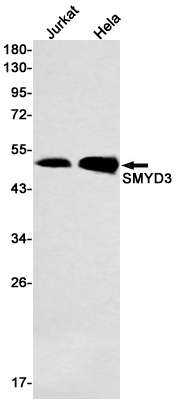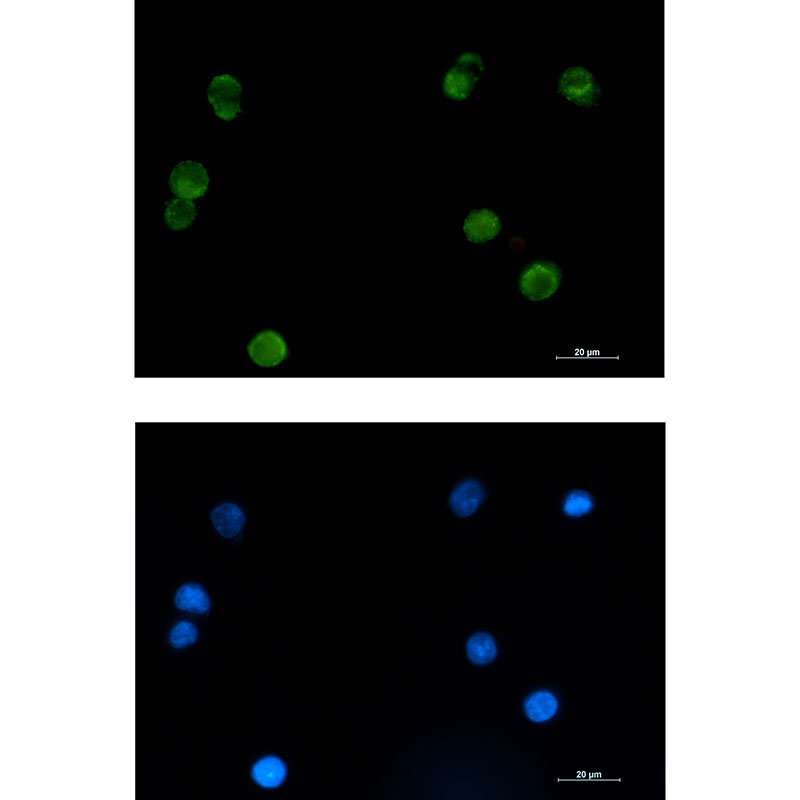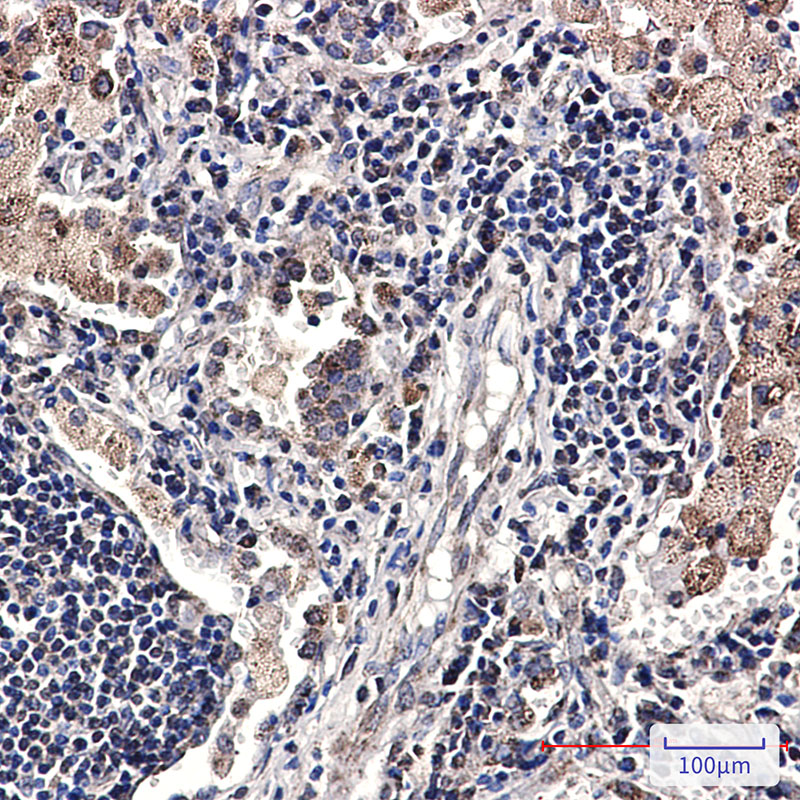


| WB | 1/500-1/1000 | Human,Mouse,Rat |
| IF | 1/20 | Human,Mouse,Rat |
| IHC | 1/50-1/100 | Human,Mouse,Rat |
| ICC | 1/50-1/200 | Human,Mouse,Rat |
| FCM | 咨询技术 | Human,Mouse,Rat |
| Elisa | 咨询技术 | Human,Mouse,Rat |
| Aliases | KMT3E; ZMYND1; ZNFN3A1; bA74P14.1 |
| Entrez GeneID | 64754 |
| WB Predicted band size | Calculated MW: 49 kDa; Observed MW: 49 kDa |
| Host/Isotype | Rabbit IgG |
| Antibody Type | Primary antibody |
| Storage | Store at 4°C short term. Aliquot and store at -20°C long term. Avoid freeze/thaw cycles. |
| Species Reactivity | Human |
| Immunogen | A synthetic peptide of human SMYD3 |
| Formulation | Purified antibody in TBS with 0.05% sodium azide,0.05%BSA and 50% glycerol. |
+ +
以下是关于SMYD3抗体的参考文献示例(注:以下为模拟内容,实际文献需通过学术数据库查询):
1. **文献名称**:*SMYD3 promotes cancer cell proliferation by regulating ERK signaling*
**作者**:Hamamoto, S. et al.
**摘要**:本研究利用SMYD3抗体进行免疫印迹和免疫组化实验,发现SMYD3通过甲基化MAP3K2激活ERK通路,促进肝癌细胞增殖。
2. **文献名称**:*SMYD3 interacts with β-catenin to enhance Wnt signaling in colorectal cancer*
**作者**:Zhang, L. et al.
**摘要**:通过SMYD3抗体免疫共沉淀实验,揭示了SMYD3与β-catenin的相互作用,表明其通过增强Wnt信号通路驱动结直肠癌进展。
3. **文献名称**:*Targeting SMYD3 as a therapeutic strategy in pancreatic cancer*
**作者**:Liu, Y. et al.
**摘要**:研究使用SMYD3抗体检测患者组织样本,发现SMYD3高表达与胰腺癌不良预后相关,并通过基因敲除验证其促癌功能。
4. **文献名称**:*SMYD3-mediated histone methylation regulates DNA repair in breast cancer*
**作者**:Sakamoto, K. et al.
**摘要**:利用SMYD3抗体进行染色质免疫沉淀(ChIP),证明SMYD3通过H3K4三甲基化调控DNA修复基因表达,影响乳腺癌化疗耐药性。
建议通过PubMed或Google Scholar搜索**"SMYD3 antibody"**或**"SMYD3 function"**获取真实文献。
SMYD3 (SET and MYND domain-containing protein 3) is a member of the SMYD family of lysine methyltransferases, which play critical roles in epigenetic regulation by catalyzing the methylation of histone and non-histone proteins. SMYD3 is distinguished by its unique N-terminal SET domain, responsible for methyltransferase activity, and a C-terminal MYND domain, which mediates protein-protein interactions. It is primarily expressed in proliferating cells and has garnered attention for its oncogenic properties. Studies show that SMYD3 is overexpressed in various cancers, including hepatocellular carcinoma, colorectal cancer, and breast cancer, where it promotes tumorigenesis by regulating genes involved in cell cycle progression, metastasis, and apoptosis resistance. For example, SMYD3 methylates MAP3K2 to activate the RAF-MEK-ERK signaling pathway, driving cancer cell proliferation.
SMYD3-specific antibodies are essential tools for studying its expression, localization, and function in both normal and diseased tissues. These antibodies are widely used in techniques like Western blotting, immunohistochemistry (IHC), immunofluorescence (IF), and chromatin immunoprecipitation (ChIP). Validating SMYD3 antibodies requires rigorous testing for specificity, often using SMYD3-knockout cell lines or competitive inhibition assays. High-quality antibodies help elucidate SMYD3's role as a potential diagnostic biomarker or therapeutic target. However, challenges remain, including cross-reactivity with other SMYD family members or non-specific binding, underscoring the need for antibody validation in relevant experimental models. Continued research on SMYD3 and its antibodies may advance our understanding of epigenetic mechanisms in cancer and precision medicine strategies.
×